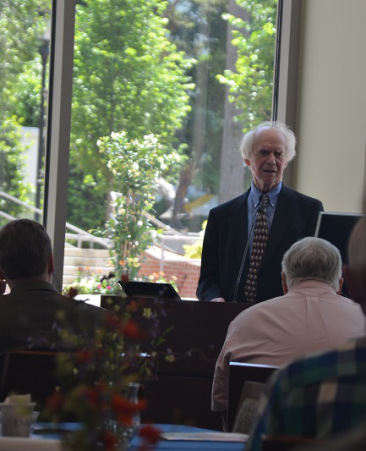By Carrie McGuffin and Jeff Brumley
The late Catholic monk, author and interfaith pioneer Thomas Merton is far more than a distant historical figure because the body of his work can actually improve the spirituality of Baptists even today, Baptist scholar E. Glenn Hinson says.
Hinson knows because that’s what happened to him through the relationship he developed with Merton during the 1960s.
“Little by little, I gained more confidence that I understood what Thomas Merton was trying to do,” Hinson told some 60 ministers gathered at Emory University in Atlanta last week.
“I think he was trying to make us understand how to be contemplatives in a world full of activity.”
But other scholars and writers say Baptist and Protestant life has already been positively influenced by the friendship between Hinson and Merton, which began in 1960 and continued until Merton’s death in Asia in 1968.
Overcoming tradition
Hinson’s involvement with Merton opened the door to contemplative forms of prayer and spirituality for Baptists, Mercer University church history and spiritual formation professor Loyd Allen said. He made the remark ahead of the dedication of an interfaith prayer garden and labyrinth at Mercer’s Atlanta campus last week.

Others say Hinson’s radical influence on Baptists matched Merton’s impact on his own tradition.
“Hinson overcame his Baptist tradition’s anti-Catholicism in a manner similar to Merton’s departure from the Catholic Church’s pre-Vatican II belief that it was the only true church,” William Apel writes in his 2006 book Signs of Peace: The Interfaith Letters of Thomas Merton.
Hinson spoke May 14 at Emory University’s Candler School of Theology in Atlanta during a celebration of the contributions of Merton, a contemplative theologian.
To mark the centenary of Merton’s birth, the Pitts Theology Library at Emory hosted an exhibit in honor of the theologian’s life and legacy titled “The Journeys of Thomas Merton,” curated by Emory librarian Denise Hanusek and featuring many first editions of Merton’s books, pamphlets and photography.
Hinson, emeritus professor of spirituality and John Loftis professor of church history at Baptist Theological Seminary at Richmond, shared with attendees about his friendship with the American Catholic writer and mystic.
As a Trappist monk at the Abbey of Our Lady of Gethsemani, a monastery in Kentucky, Merton wrote extensively on contemplation, comparative religion and social activism focusing on the need for contemplation in an active world and emphasizing the power of nonviolent resistance.
Merton, who continues to be an inspiration to people of all faiths and spiritual journeys, died at the age of 53 in 1968 while on a tour of Asia. On the tour, he met with the Dalai Lama and other world religion leaders.
Preserving legacy
Through anecdotes of his relationship with Merton, Hinson suggested ways that Baptists could continue to celebrate the theologian and preserve his legacy of encouraging contemplation amidst an active life.
Hinson noted that the contemplative lifestyle that Merton experienced during his time as a Trappist monk was something that could reach out to people beyond the monastery walls to those living active lives.
“We must not forget that Merton was not trying to project something new. He was not an innovator,” Hinson said. “What he was trying to do was present in a fresh way the ideas that came from the contemplative tradition. … We need to get down to this tradition that extends through the centuries, back to Jesus and the Hebrew Bible and the whole tradition of the people of God.”

To deeply immerse ourselves in this contemplative tradition and become contemplatives in a world of action are the two ways Merton’s legacy can be preserved, Hinson said. Other ways to preserve Merton’s legacy and the contemplative tradition, Hinson added, include striving for attentiveness to God and enhancing this attentiveness to God through retreat and times of rest and solitude, as well as setting the church’s goal to become a “school of love.”
“We honor [Merton’s] legacy best not only to preserve, but to carry forward his ideas,” Hinson said. “We will honor him as we carry forward, as we walk in different circumstances.”
This event honoring both Merton and Hinson was sponsored by Cooperative Baptist Fellowship Peer Learning Groups (PLG) and is the first in a series of upcoming PLG-sponsored educational events. PLGs provide an opportunity for ministers to form together, shaping one another through regular opportunities of worship, spiritual formation, discussion of ministry-related issues and fellowship.
